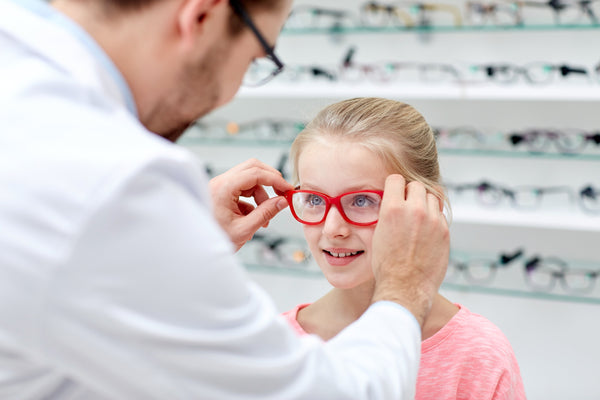Are contact lenses and glasses prescriptions the same?
While both glasses and contact lenses do the same job in correcting your eyesight, there are some obvious differences in how each is worn. Glasses rest on the nose and are positioned away from the eyes, whereas contact lenses are in direct contact with your eyeball. These differences are the fundamental reasons why contact lenses and glasses prescriptions are absolutely not the same. In this article, we’ll explain why in more detail.
Contact lens vs glasses prescription – what’s the difference?
Quite simply, the lenses in your glasses will be very different to your contact lenses. That’s because each type of lens refracts light differently and therefore during an eye test, different measurements have to be made. The measurements from one eye test are not compatible with the other. So, is the prescription for contacts the same as glasses? The answer is NO because you need to have 2 separate eye tests, which will result in 2 different prescriptions.
Contact lens prescription
A contact lens prescription comprises a set of measurements relating to the curvature, size and power of the contact lens along with other relevant information. These measurements are carried out by an optometrist, also known as an ophthalmic optician.
Glasses prescription
An optometrist or ophthalmic optician is also responsible for carrying out the actual eye tests for glasses and lenses. The tests are to determine the strength of the lenses you require, along with other factors such as eye dominance, pupillary distance and axis number. All this information will be included in your glasses prescription.
Learn how to read your glasses prescription
How to read your contact lens prescription
Have you ever wondered what all the abbreviations and letters on your contact lens prescription mean? Read on to find out.
What does Base Curve (BC) mean?
Base Curve (BC) refers to the specific curve with which a contact lens is made. Different corneal curves will need different base curve lenses, although with modern more flexible contact lens materials, there is some lea way in this.
What does Diameter (DIA) mean?
This measurement refers to the Diameter (DIA) of the contact lens itself and corresponds with the size of your cornea. It is the measurement from one edge of the lens to the other and is measured in millimetres.
What does Power/Sphere (PWR/SPH) mean?
The term Power (PWR) together with Sphere (SPH) refers to the strength of the lens. For long-sightedness this figure will show a plus sign (+) and for short-sightedness, it will begin with a minus sign (-).
Other contact lens prescription figures
People who have an eye defect such as astigmatism, will need to wear toric lenses and therefore will see additional words or abbreviations on their prescription. The same applies to people who might have presbyopia or short-sightedness, and have a prescription for varifocal or multifocal contact lenses.
Other contact lens prescription figures are Prism, which refers to a lens or lenses that are designed to correct double vision. Also, Pupillary Distance (PD), which is a term that relates to the distance between the centre of your pupils. It is measured in millimetres and it is important that this measurement is accurate to ensure clear and comfortable vision.
OD - Stands for Oculus Dexter, which means ‘right eye’
OS - Stands for Oculus Sinister, which means ‘left eye’
BAL - Stands for Balance, which means both eyes are prescribed the same lenses.
DS - Stands for Dioptres Sphere, which means the eyes are spherical in shape.
VA - Stands for Visual Acuity, which is a measurement of how clearly a person can see with corrective lenses. This measurement is expressed as a fraction.
Your contact lens prescription might also include the brand or manufacturer’s name.
What does Cylinder (CYL) mean?
The term Cylinder (CYL) refers to an astigmatic prescription. if you have astigmatism then your eye will be more oval-shaped as opposed to globe-shaped. With this condition, you would need specially designed contact lenses called Toric lenses.
What does Axis (AX) mean?
Axis (AX) refers to the angle that the cylinder or astigmatic correction is placed in order to provide clear vision. This is a number, which is measured in degrees from 0 to 179.
What does Addition (ADD) mean?
The term Addition (ADD) refers to the amount of additional correction required to see clearly nearby and is given over and above the distance contact lens prescription. Multifocal contact lenses will have an ‘add’ in their prescription. An ‘add’ is generally only required when you develop presbyopia (an age related inflexibility of the intraocular lens, that typically starts between age 40and 45)
What does Dominant mean?
Most people have a Dominant eye which they unconsciously favour slightly, and a non-dominant eye. Certain contact lenses are best fitted taking this into account (generally multifocal contact lenses). Typically the dominant eye is fitted with the D lens (for better Distance vision) and the non-dominant eye is for better Near vision (this would be the N lens).
Can you convert a glasses prescription to a contact lens prescription?
No, it’s not possible to do this because the optics of the lenses are different. Likewise, you cannot convert a contact lens prescription to a glasses prescription.
How to get a contact lens prescription
If you would like to know how to get contact lenses then you will first need to make an appointment with your optician for a contact lens prescription. Your appointment with your optician will include an assessment and a contact lens eye test. This is a different eye test to the type you would need for glasses. After your initial assessment and test, you will then need to have a contact lens fitting. Your optician will demonstrate how to safely insert and remove your lenses and how to care for them.
Finally, you will receive your free written contact lens prescription. You can buy your contact lenses from the optician that carried out your eye test or you can buy them from another optician or an online supplier.
Contact lenses need to be reviewed more frequently
You should be aware that your eyesight can change over time so it’s important you get your eyes retested at least every 2 years. If you notice any changes in your vision at any time before that period then contact your optician for a check-up.
Book a contact lens consultation today.
Learn more









